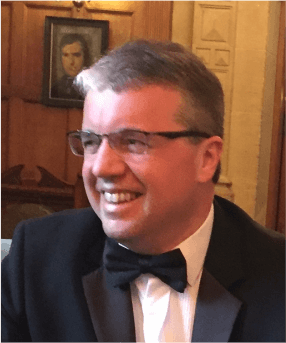- Homepage
- Programme
- Registration
- Practical Guide
- About Neuronus
UCL Queen Square Institute of Neurology, University College London, UK

Dmitri A. Rusakov is a Professor of Neuroscience and Wellcome Principal Fellow at the UCL Institute of Neurology. He is also the head of the Laboratory of Synaptic Imaging. His current area of interest is the interaction between astroglia, synaptic circuits, and the cellular matrix in the brain.
The Laboratory of Synaptic Imaging investigates, among other areas, the signal formation and integration in neural circuits with astroglia, and nanomolar landscapes of basal Ca2+ in neurons and astroglia. Using two-photon excitation microscopy with patch-clamp electrophysiology and (opto)genetic tools as well as a submillisecond-resolution solution-exchange methodology they monitor calcium signaling and probe receptor kinetics in order to contribute to the interdisciplinary effort to address cellular mechanisms of epilepsy and other neurodegenerative diseases.
Dmitri A. Rusakov obtained his PhD at the NAS Bogomoletz Institute of Physiology in Kiev. He subsequently worked in laboratories in the UK gaining an independent investigator position at the MRC National Institute for Medical Research in 1999. In 2000 he joined UCL where he works to this day.
Extrasynaptic actions of the excitatory neurotransmitter glutamate are limited by high-affinity transporters expressed by perisynaptic astroglia. This helps maintain point-to-point transmission in excitatory circuits. Memory formation in the brain is associated with synaptic remodelling, but whether and how this affects perisynaptic astroglial processes (PAPs) and therefore extrasynaptic glutamate actions is poorly understood. We used a battery of advanced imaging methods, in situ and in vivo, to find that a classical synaptic memory mechanism, long-term potentiation (LTP), triggers withdrawal of PAPs from potentiated synapses. Optical glutamate sensors combined with patch-clamp and super-resolved 3D molecular localisation reveal that LTP induction in ex vivo brain slices thus prompts spatial retreat of astroglial glutamate transporters, boosting glutamate spillover and NMDA receptor-mediated inter-synaptic cross-talk. The LTP-triggered PAP withdrawal involves astroglial NKCC1 transporters and the actin-controlling protein cofilin but does not depend on major Ca2+-dependent cascades in astrocytes. We combine targeted viral transduction with multiplexed imaging in vivo to document a similar phenomenon under the physiological LTP paradigm (rhythmic whisker stimulation) in the intact brain. Our results thus uncover a mechanism by which a memory trace at one synapse could alter signal handling in multiple neighbouring connections by engaging use-dependent plasticity of local astroglia.
Michaluk P, Heller JP, Rusakov DA (2021) Rapid recycling of glutamate transporters on the astroglial surface. eLife 10: e64714, pp 1-18.
Henneberger C, ..., Rusakov DA (2020) LTP induction boosts glutamate spillover by driving withdrawal of perisynaptic astroglia. Neuron 108: 919-936.
Zheng K, Bard L, Reynolds J, King K, Jensen TP, Gourine AV, Rusakov DA (2015) Time-resolved imaging reveals heterogeneous landscapes of nanomolar Ca2+ in neurons and astroglia. Neuron 88: 277-288
Henneberger, C., Papouin, T., Oliet, S.H.R., Rusakov, D.A., 2010. Long-term potentiation depends on release of D-serine from astrocytes. Nature 463, 232–236.